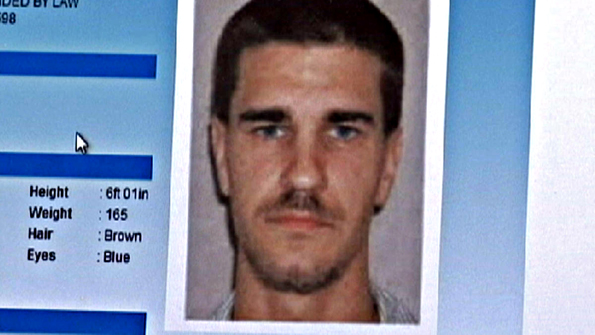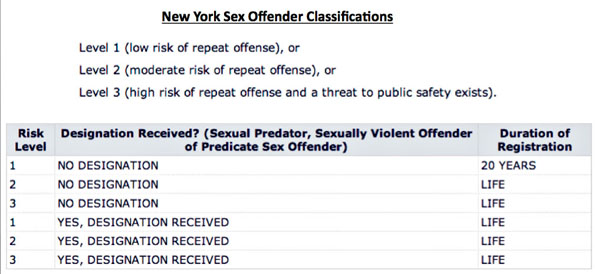The New York State Court Of Appeals ruled last month - in the case of the People v Diack - that New York State law trumps local laws regarding residency restrictions for registered sex offenders.
In recent years, scores of municipalities have enacted local laws - that are stricter than NY state law - prohibiting registered sex offenders from living within a certain distance of schools, daycare centers, parks, youth centers and other areas where children are likely to congregate.
The February 17th Court of Appeals ruling essentially invalidates these local sex offender laws - reported to be - by the New York Civil Liberties Union - some 21 county and 109 town and city local laws.
In the case of the People v Diack, the Court of Appeals decided that charges against Michael Diack, a level 1 sex offender, no longer on parole, charged with violating a Nassau County law, must be dismissed because Diack didn't violate New York State law.
Citing the doctrine of preemption which prohibits a local government from enacting local laws inconsistent with the State Constitution or general laws of the state, the Court ruled, the state's 'purpose and design' in enacting various laws such as the Sex Offenders Registration Act (1996) or "Megan's Law", the Sexual Assault Reform Act (2000; broadened in 2005), the Sex Offender Management and Treatment Act (2007), and Chapter 568 of the Laws of 2008 (Chapter 568), is to preempt local sex offender residency restriction legislation and "occupy the entire field".
In the case at hand, Diack moved within 500 feet of two schools, and Local Law No. 4–2006 of the County of Nassau prohibits any sex offender from residing within 1,000 feet of a school.
But New York State law doesn't regulate Level 1 offenders not on parole such as Diack.
State law prohibits Level 3 (the highest risk of reoffending), and those Level 1 and Level 2 sex offenders whose victims were under 18, and who are on probation, conditional release or parole, from being within 1000 feet of a school.
Judge Eugene Pigott, writing the opinion for the court, said, "Local Law 4 and similar laws are easily passed and, understandably, receive local support, but, as the State has acknowledged, communities in recent years have taken to shifting the burden of sex offender housing to neighboring communities, thereby frustrating the State's policy that each community bear the burden noting that 'it is not appropriate for any one community or county to bear an inappropriate burden in housing sex offenders because another community has attempted to shift its responsibility for those offenders onto other areas.'"
And shifting the burden is what many communities have done creating a high level of concentration of sex offenders in certain residential areas - such as Niagara Falls, New York where there is one registered sex offender for every 278 people.
While communities passed stringent laws with expanding buffer zones, finding acceptable housing for sex offenders became a challenge for state probation officials because sex offenders, upon release from prison, typically return to the communities where they previously resided.
In urban areas, a 2,000 feet buffer zone can practically eliminate most available housing and services effectively preventing sex offenders from moving into town.
The Town of Niagara's local law's buffer zone is 2000 feet and includes not only schools but athletic facilities, community centers, and private recreational facilities in mobile home parks and subdivisions.
In 2006 the City of Niagara Falls passed a local law establishing residency restrictions for sex offenders who committed offenses against minors setting the safety zone at 1,500 feet of public or non-public schools, child care facilities, parks or playgrounds.
The town of Cicero's local law states that Level 2 and Level 3 sex offenders cannot live within one mile of a school and 1,500 feet from a park.
The City of North Tonawanda passed a local law with a quarter-mile buffer zone.
The Village of Massapequa Park prohibited registered sex offenders from residing within a one-mile radius of any school or park.
Suffolk County prohibited sex offenders from residing within a quarter mile of any school, daycare, playground or amusement park.
Rensselaer County prohibited level two and level three sex offenders from residing within 2,000 feet of a school or childcare facility.
Rockland County prohibited sex offenders from residing, working or loitering within 1,000 feet of a school, childcare facility, playground, youth center or public swimming pool.
Niagara county passed a law in 2008 applying the 1,000-foot rule to Level 2 and Level 3 offenders whose parole or probation terms expired.
North Tonawanda passed a law to impose a quarter mile buffer zone.
With the Court of Appeals ruling, all these laws are unenforceable - at least for now.
In reaction to the Court of Appeals Ruling, the New York State Senate passed a slate of bills -which are waiting for action by the Assembly - including: prohibiting Level 2 and Level 3 sex offenders from being placed in temporary or emergency housing or homeless shelters where children are present; making it a crime to knowingly house or employ a sex offender who has failed to register or verify employment; prohibit certain sex offenders from being granted custody and unsupervised visitation with a child; Fix a loophole that allows sex offenders to spend significant amounts of time at a residence other than the primary one registered with the state by requiring sex offenders to report multiple or part-time residences; require the Office for People with Developmental Disabilities to contact local officials when a sex offender is placed in a community residence within their municipality; prohibit sex offenders from living in student housing; create a sex offender public awareness program; provide municipalities with the ability to enact local laws that strengthen sex offender restrictions; communities would be able to put additional restrictions in place so long as they are not less restrictive than state laws; close loopholes that allow sex offenders to reside close to pre-K and kindergarten programs; decrease the potential time a sex offender could be released into the community before risk levels are determined; prohibit Level 2 or 3 sex offenders from residing within 1,500 feet of their victim's residence; prevent convicted Level 1, 2, or 3 sex offenders from residing within 1,000 feet of a school; and require Level 2 and 3 sex offenders to disclose their employment in addition to their residence on the state's registry.
A number of these bills have significant support in the New York State Assembly on both sides of the political aisle.
 |
| Michael Diack, a level one offender, is free to live anywhere, the Court of Appeal ruled. |
|
|
|
|
|
 |
| Sex offenders, upon their release, are assigned a risk level dependent upon whether their risk for reoffending is low (level one), moderate (level two) or high (level three). Level three is reserved for sexually violent offenders who commit predatory acts characterized by repetitive and compulsive behavior |
|
|
|
|
|



